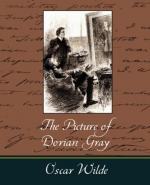“I have known everything,” said Lord Henry, with a sad look in his eyes, “but I am always ready for a new emotion. I am afraid that there is no such thing, for me at any rate. Still, your wonderful girl may thrill me. I love acting. It is so much more real than life. Let us go. Dorian, you will come with me.—I am so sorry, Basil, but there is only room for two in the brougham. You must follow us in a hansom.”
They got up and put on their coats, sipping their coffee standing. Hallward was silent and preoccupied. There was a gloom over him. He could not bear this marriage, and yet it seemed to him to be better than many other things that might have happened. After a few moments, they all passed down-stairs. He drove off by himself, as had been arranged, and watched the flashing lights of the little brougham in front of him. A strange sense of loss came over him. [36] He felt that Dorian Gray would never again be to him all that he had been in the past. His eyes darkened, and the crowded flaring streets became blurred to him. When the cab drew up at the doors of the theatre, it seemed to him that he had grown years older.
CHAPTER V
[...36] For some reason or other, the house was crowded that night, and the fat Jew manager who met them at the door was beaming from ear to ear with an oily, tremulous smile. He escorted them to their box with a sort of pompous humility, waving his fat jewelled hands, and talking at the top of his voice. Dorian Gray loathed him more than ever. He felt as if he had come to look for Miranda and had been met by Caliban. Lord Henry, upon the other hand, rather liked him. At least he declared he did, and insisted on shaking him by the hand, and assured him that he was proud to meet a man who had discovered a real genius and gone bankrupt over Shakespeare. Hallward amused himself with watching the faces in the pit. The heat was terribly oppressive, and the huge sunlight flamed like a monstrous dahlia with petals of fire. The youths in the gallery had taken off their coats and waistcoats and hung them over the side. They talked to each other across the theatre, and shared their oranges with the tawdry painted girls who sat by them. Some women were laughing in the pit; their voices were horribly shrill and discordant. The sound of the popping of corks came from the bar.
“What a place to find one’s divinity in!” said Lord Henry.
“Yes!” answered Dorian Gray. “It was here I found her, and she is divine beyond all living things. When she acts you will forget everything. These common people here, with their coarse faces and brutal gestures, become quite different when she is on the stage. They sit silently and watch her. They weep and laugh as she wills them to do. She makes them as responsive as a violin. She spiritualizes them, and one feels that they are of the same flesh and blood as one’s self.”




